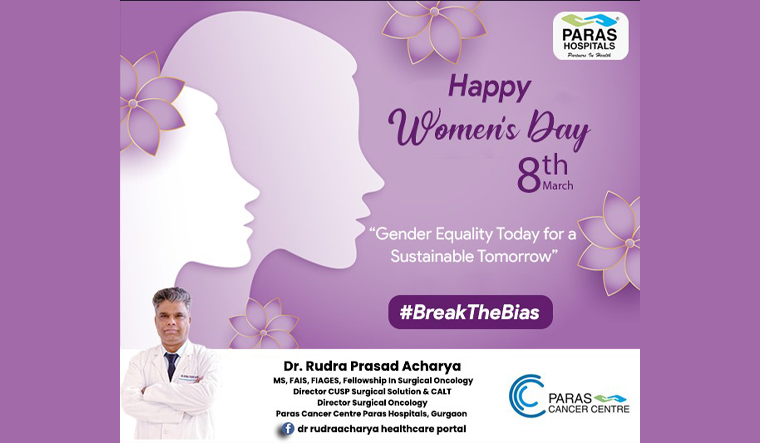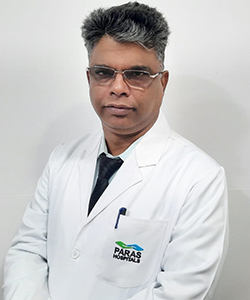On International Women's Day 8th March, Dr Rudra Prasad Acharya – Director Surgical Oncology , Paras Cancer Center highlights about the fight of Cancer among Womens. Today's woman is multi-faceted; who takes care of the family as well as her aspirations. There are times when she falls prey to lifestyle diseases. Women health problems are on the rise partly because of a constant race against time and partly due to sheer ignorance.
Cancer rates have increased consistently throughout the world, especially in low- and middle-income countries. Cancer has become the second cause of mortality after cardiovascular diseases worldwide, and this has influenced local, national and global health policies. With being the most common type of cancer in women, breast cancer accounts for 14% of cancers in Indian women. It is reported that with every four minutes, an Indian woman is diagnosed with breast cancer. Breast cancer is on the rise, both in rural and urban India.
THE RISE OF CANCER IN WOMEN
There’s no escaping the fine print – Breast cancer is the most common form of cancer in the country, having overtaken Cervical cancer. In cities like Mumbai, Delhi, Bengaluru, Bhopal, Kolkata, Chennai, Ahmedabad, breast cancer accounts for 25% to 32% of all female cancers, more than 1/4th of all female cancers. It’s also more common in the younger age group, almost 50% of all cases are in the age group of 25-50 and more than 70% of the cases present in the advanced stage had poor survival and high mortality.
The first question that my patients who are diagnosed with cancer ask is - Why Me?
Is there a profile for women who suffer from breast, cervical or ovarian cancer? For ladies, they think that diagnosis of breast or cervical cancer is a writing on the wall and perhaps her days are numbered. But it's not really like that; newer techniques of surgery and chemo – radiotherapy has led to not only cure but also can preserve the feminity.
“NORMAL" AFTER CANCER TREATMENT?
Yes, let’s admit it getting diagnosed with breast cancer, fighting questions like ‘why me’, subsequent treatment, tackling the anxiety about survival…all these can drain you physically, mentally, emotionally and spiritually. It’s not easy to overcome all these but then, nothing worth conquering and cherishing for life does come easy to anyone.
Those who have gone through cancer treatment describe the first few months as a time of change. It’s not so much "getting back to normal" as it is finding out what’s normal for you now. People often say that life has new meaning or that they look at things differently. You can also expect things to keep changing as you begin your recovery.
For some survivors, the long-term effects of cancer and its treatment may be made worse by the effects of aging, or by other health conditions, such as diabetes or heart disease, that you may have had before cancer. Breast cancer survivors who have had surgery may find everyday activities like reaching or stretching painful; health conditions such as arthritis can make these activities even more difficult.
Some cancer treatments may cause future health problems, sometimes these problems don't appear right away; some don't appear until years after treatment.
In one way or another, they all have to do with the quality of your life, which has been threatened and disrupted by cancer.
When you are dealing with cancer, you face many goals and challenges. Some of these are medical and physical, some are emotional, and others are interpersonal and spiritual. Psychological , emotional & social concerns related to disease and treatment are common in Indian women in relation to prevailing societal attitudes regarding the role of women as wife, mother, and the carer of older in-laws. Hair loss caused particular distress. Family and faith were key support systems for almost all the women, although it was also the causes of distress for some.
Changes of body Image
Post-surgery, there will be scars and bruises in the chest/breast area. If a mastectomy is performed as part of the treatment, it may make a survivor feel incomplete. In addition to these are hair fall and its eventual regrowth. All these physical changes would affect the survivors emotionally too. But newer techniques of surgery makes the scars less prominent and breast conservative surgery and reconstruction techniques make feel to retain “Women – ness”.
Coping with emotional and social effects
You can have emotional and social effects after a cancer diagnosis. This may include dealing with difficult emotions, such as sadness, anxiety, or anger, or managing your stress level. Sometimes, people find it difficult to express how they feel to their loved ones.
Coping with the stigma of Cervical cancer
Cervical cancer, like other cancers that affect the sex organs, can be difficult or uncomfortable to discuss. People with many different types of cancer, such as testicular, penile, vaginal, and vulvar cancers, can experience feelings of embarrassment when discussing these sensitive areas of their bodies. Living with this stigma can make patients feel guilty, hopeless, embarrassed, ashamed, and isolated.
Coping with psychological issues
Almost all cancer survivors will face psychological and emotional issues like fear of reoccurrence, depression, body image etc. that can show up many years after treatment. The good news is that you don’t have to suffer alone. Therapy, support groups, social media and community resources are available to help you cope with these issues.
Coping with the workplace
Women Cancer survivors often feel that they can no longer relate to co-workers who haven’t experienced cancer. You may be reluctant to talk about your cancer treatment to employers or co-workers for fear of being treated differently.
Here are a few tips for embracing your new normal and inspiring others along the way:
Be Patient with Yourself
Even when treatment is over, your physical body and emotional spirit are still healing. You might be anxious about going back to work, school, or having to take care of your family. You could still feel very, very tired. It’s important to remember that fatigue and other side effects of treatment don’t go away as soon as treatment ends. Whether with surgery, radiation therapy, chemotherapy or all of the above, your body just went through a major trauma and needs time to heal.
Another thing some people struggle with is how their hair is growing back -- thicker, thinner, curlier, or even different color. Hair loss and regrowth might seem like a trivial aspect of cancer treatment, but it can have a big impact on a person’s outlook and ability to feel like themselves again. They develop thicker and stronger hair to maintain the body image.
All of these feelings and concerns are completely normal. With a little patience and support from friends and family, and frequent checkups with your physician, you can gradually find your new normal.
GO Greens
Some people equate surviving cancer with getting a new lease on life. As a reason to ditch bad habits and focus on things that make you feel good -- inside and out. Eating a balanced diet high in antioxidants is one of the best and easiest ways to boost your health. There are even certain foods that can strengthen your immune system and help you maintain a healthy body weight, which are primary factors in the fight against cancer. There are many of these foods, including broccoli, tomatoes, blueberries and walnuts.
Get Moving
There is convincing evidence that physical activity is associated with a reduced risk of cancers of the colon and breast. But even more importantly, there’s also research that shows that regular exercise can reduce the recurrence of breast cancer.
Exercise can also play a huge role in helping cancer survivors feel energized again. Evidence shows that exercise boosts your mood, your memory and can even help reverse the effects of stress.
The Takeaway…
Life for women after cancer will have its ups and downs. Some days will be better than others, but you’ll always have a different, unique, perspective on life to draw from.
When you are dealing with cancer, you face many goals and challenges. Some of these are medical and physical, some are emotional, and others are interpersonal and spiritual. In one way or another, they all have to do with the quality of your life, which has been threatened and disrupted by cancer.
The survival rates of breast cancer in India are low because the detection takes place late. The only way to change these numbers is by increasing awareness. Breast cancer is a treatable disease and chances of survival are higher if it’s detected in time. The only way to do so is by being aware of how it can be detected and early diagnosis can be done.
Other ways to overcome this is by leading a healthy lifestyle, being aware of family medical histories – so that if you know you’re genetically inclined towards it, you can take preventive drugs or undergo preventive surgery. The simplest way to breast cancer prevention is by being able to do a self-breast examination. Women should be doing this on a regular basis after they turn 30.
Remember, with acceptance comes peace; not everyone survives the onslaught of cancer. If you’re survivor, it simply means that you’re tough and you have it in you to give cancer and its side effects a run for their money.
So today on #International Women's Day of 2022, our aim is to fix the bias and erase any gender inequality. How can we do this? By addressing ourselves. You, as women, should become strong, Do not let somebody else look after your health, Do not wait for somebody else to take you to a facility, do it yourself. Be careful yourself, eat well, watch out. Don't stick to leftovers, eat with the family. Eat a good diet and remain healthy; don't just keep sitting, WALK. Go out there and walk yourself towards health and be your gender equal.
I wish All the Best to all young, old, very old and very young women out there; remember Womens are pride of the house and nation, keep your head high and today's survivors are better motivated and determined to achieve more in their life.. !
Written By:
Dr Rudra Prasad Acharya
Director CUSP Surgical Solutions &
Director Surgical Oncology,
Minimal Invasive & Robotic Oncosurgery
MS, FAIS, FIAGES
Fellow, Surgical Oncology (GCRI)
Colorectal fellow (Sydney, Australia)
HPB fellow (Tokya, Japan)
Paras Cancer Centre,
Paras Group of Hospitals
Gurgaon, Haryana
To Reach him;
Call +919810718247 or +918750062747
Email acharyarp@yahoo.com
Website www.drrudraacharya.com



